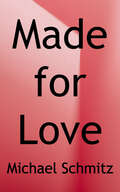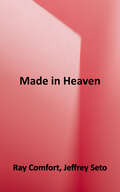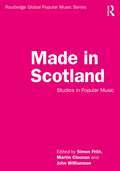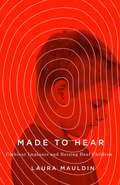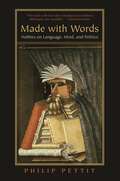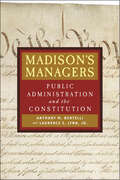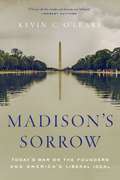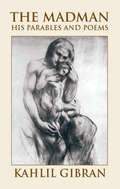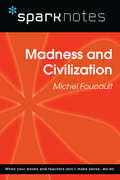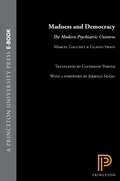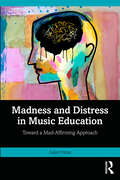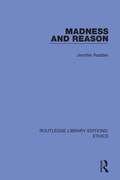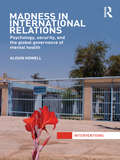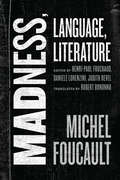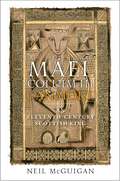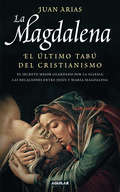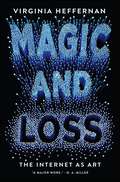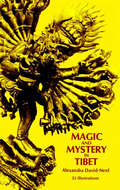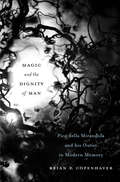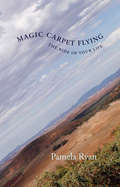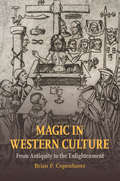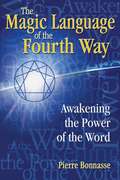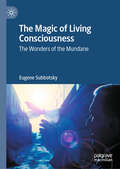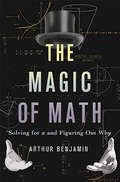- Table View
- List View
Made for Love: Same-Sex Attraction and the Catholic Church
by Michael SchmitzIn Made for Love, Fr. Michael Schmitz presents the Catholic teaching on same-sex attraction and same-sex "sexual" relations. <p><p>He begins by giving background information regarding the different worldviews of the human person, the philosophical ideas of nature and purpose, the differences between objective and subjective truth, the principal of non-contradiction, and the fallen human nature that resulted from Original Sin. He then discusses in great detail the nature and ends of human sexuality and the nature of true love, while, in a compassionate and non-judgmental way, explaining the flawed nature of same-sex "sexual" relations. <p><p>While this book is intended primarily for those who have same-sex attraction and their family and friends, its presentation of the compassionate truth of Catholic teaching on same-sex attraction will be of great benefit to everyone in today's society.
Made in Heaven: Man's Indiscriminate Stealing of God's Amazing Design
by Ray Comfort Jeffrey SetoEngineers have long examined God's creation to understand and mimic complex, proven mechanics of design. They have plumbed the depths of the natural world, encompassing insects and plants to man in search of wisdom and insight. The simplicity yet intricacy of how God designs work and how He manufacturers complexity in nature astounds and inspires engineers in hypothesis and designs that could not be formed otherwise.
Made in Scotland: Studies in Popular Music (Routledge Global Popular Music Series)
by Simon Frith Martin Cloonan John WilliamsonMade in Scotland: Studies in Popular Music serves as a comprehensive and thorough introduction to the history, politics, culture, and musicology of twentieth- and twenty-first-century popular music in Scotland. The volume consists of essays by local experts and leading scholars in Scottish music and culture, and covers the major figures, styles, and social contexts of popular music in Scotland. Each essay provides adequate context so readers understand why the figure or genre under discussion is of lasting significance. The book includes a general introduction to Scottish popular music, followed by essays organized into three thematic sections: Histories, Politics and Policies, and Futures and Imaginings. Examining music as cultural expression in a country that is both a nation and a region within a larger state, this volume uses popular music to analyse Scottishness, independence, and diversity and offers new insights into the complexity of cultural identity, the power of historical imagination, and the effects of power structures in music. It is a vital read for scholars and students interested in how popular music interacts with and shapes such issues both within and beyond the borders of Scotland.
Made to Hear: Cochlear Implants and Raising Deaf Children (A Quadrant Book)
by Laura MauldinA mother whose child has had a cochlear implant tells Laura Mauldin why enrollment in the sign language program at her daughter&’s school is plummeting: &“The majority of parents want their kids to talk.&” Some parents, however, feel very differently, because &“curing&” deafness with cochlear implants is uncertain, difficult, and freighted with judgment about what is normal, acceptable, and right. Made to Hear sensitively and thoroughly considers the structure and culture of the systems we have built to make deaf children hear.Based on accounts of and interviews with families who adopt the cochlear implant for their deaf children, this book describes the experiences of mothers as they navigate the health care system, their interactions with the professionals who work with them, and the influence of neuroscience on the process. Though Mauldin explains the politics surrounding the issue, her focus is not on the controversy of whether to have a cochlear implant but on the long-term, multiyear undertaking of implantation. Her study provides a nuanced view of a social context in which science, technology, and medicine are trusted to vanquish disability—and in which mothers are expected to use these tools. Made to Hear reveals that implantation has the central goal of controlling the development of the deaf child&’s brain by boosting synapses for spoken language and inhibiting those for sign language, placing the politics of neuroscience front and center.Examining the consequences of cochlear implant technology for professionals and parents of deaf children, Made to Hear shows how certain neuroscientific claims about neuroplasticity, deafness, and language are deployed to encourage compliance with medical technology.
Made with Words: Hobbes on Language, Mind, and Politics
by Philip PettitHobbes's extreme political views have commanded so much attention that they have eclipsed his work on language and mind, and on reasoning, personhood, and group formation. But this work is of immense interest in itself, as Philip Pettit shows in Made with Words, and it critically shapes Hobbes's political philosophy. Pettit argues that it was Hobbes, not later thinkers like Rousseau, who invented the invention of language thesis--the idea that language is a cultural innovation that transformed the human mind. The invention, in Hobbes's story, is a double-edged sword. It enables human beings to reason, commit themselves as persons, and incorporate in groups. But it also allows them to agonize about the future and about their standing relative to one another; it takes them out of the Eden of animal silence and into a life of inescapable conflict--the state of nature. Still, if language leads into this wasteland, according to Hobbes, it can also lead out. It can enable people to establish a commonwealth where the words of law and morality have a common, enforceable sense, and where people can invoke the sanctions of an absolute sovereign to give their words to one another in credible commitment and contract. Written by one of today's leading philosophers, Made with Words is both an original reinterpretation and a clear and lively introduction to Hobbes's thought.
Madison's Managers: Public Administration and the Constitution (Johns Hopkins Studies in Governance and Public Management)
by Anthony M. Bertelli E. Jr. LynnA case for the constitutional roots of public administration: “Essential to the field as we develop new theories and applications in a postmodern America.” ?Political Studies ReviewCombining insights from traditional thought and practice and from contemporary political analysis, Madison’s Managers presents a constitutional theory of public administration in the United States. Anthony Michael Bertelli and Laurence E. Lynn Jr. contend that managerial responsibility in American government depends on official respect for the separation of powers and a commitment to judgment, balance, rationality, and accountability in managerial practice.The authors argue that public management—administration by unelected officials of public agencies and activities based on authority delegated to them by policymakers—derives from the principles of American constitutionalism, articulated most clearly by James Madison. Public management is, they argue, a constitutional institution necessary to successful governance under the separation of powers. To support their argument, Bertelli and Lynn combine two intellectual traditions often regarded as antagonistic: modern political economy, which regards public administration as controlled through bargaining among the separate powers and organized interests, and traditional public administration, which emphasizes the responsible implementation of policies established by legislatures and elected executives while respecting the procedural and substantive rights enforced by the courts. These literatures are mutually reinforcing, the authors argue, because both feature the role of constitutional principles in public management.Madison’s Managers challenges public management scholars and professionals to recognize that the legitimacy and future of public administration depend on its constitutional foundations and their specific implications for managerial practice.
Madison's Sorrow: Today's War on the Founders and America's Liberal Ideal
by Kevin O'LearyAn eye-opening cultural history of the political revolution that has destroyed the Republican Party and unleashed an illiberal crusade against the ideals of the Founding Fathers.The story of America is the struggle between our liberal ideal and illiberal resistance. Donald Trump catalyzed a reactionary revolution by tapping into the dark, shadowy side of American democracy that embraces exclusion and inequality. Throughout American history these alarming impulses have come to the forefront of our culture—during the Civil War, the era of the Robber Barons, and the Civil Rights Movement—but have now come to fruition in the presidency of Donald Trump. Arguing that the contemporary Republican Party is waging a counterrevolution against the core beliefs of the nation, journalist and scholar Kevin C. O&’Leary cracks open American history to reveal the essence of America&’s liberal heritage by critiquing the reactionary illiberal currents that periodically threaten American democracy. American politics is no longer an ongoing debate between liberals and conservatives because the new Republican Party embraces the feudal values of the Old World. While there are millions of conservatives in the population, the elected leadership of the GOP is deeply reactionary. Today&’s marriage of white-identity Southerners and their northern allies to moneyed libertarians is no run-of-the-mill political partnership. Instead, it is extraordinarily dangerous. Clearly, conservatives have lost their party. And without conservatives debating liberals in an intellectual, respectful manner to address the nation&’s problems, Madisonian democracy breaks down. A stimulating reinterpretation of the American experience, Madison&’s Sorrow exposes the intellectual and moral deficiencies of the illiberal right while offering a robust defense of the liberal tradition.
The Madman: His Parables and Poems
by Kahlil GibranWidely known in America as author of The Prophet, which sold more copies in the 20th century than any other book but the Bible, the great Lebanese-American poet and artist Kahlil Gibran (1883–1931) first became known to Americans in 1918 with the publication of The Madman.Thought-provoking and inspiring, the book is a collection of memorable, life-affirming parables and poems, many of them casting an ironic light on the beliefs, aspirations, and vanities of humankind — and many reminiscent of the work of Tagore and Nietzsche, both of whom were strong influences on Gibran.Among the 35 poems and parables in this volume are "How I Became a Madman," "The Two Hermits," "The Wise Dog," "The Good God and the Evil God," "Night and the Madman," "The Three Ants," "When My Sorrow Was Born," "And When My Joy Was Born," and many more.The book includes several illustrations by the author, whose exquisite drawings are reminiscent of Rodin and the best of Blake. ". . . the greatest of Arab Romantics and father of a 20th-century Romantic tradition whose impact on Arab writers has been at least as strong as that of 19th-century figures such as Wordsworth and Keats on their English-speaking counterparts." — Dr. Suheil Bushrui, Director of the Kahlil Gibran Chair on Values and Peace, University of Maryland
Madness and Civilization (SparkNotes Philosophy Guide)
by SparkNotesMadness and Civilization (SparkNotes Philosophy Guide) Making the reading experience fun! SparkNotes Philosophy Guides are one-stop guides to the great works of philosophy–masterpieces that stand at the foundations of Western thought. Inside each Philosophy Guide you&’ll find insightful overviews of great philosophical works of the Western world.
Madness and Democracy: The Modern Psychiatric Universe (New French Thought Series)
by Marcel Gauchet Gladys SwainHow the insane asylum became a laboratory of democracy is revealed in this provocative look at the treatment of the mentally ill in nineteenth-century France. Political thinkers reasoned that if government was to rest in the hands of individuals, then measures should be taken to understand the deepest reaches of the self, including the state of madness. Marcel Gauchet and Gladys Swain maintain that the asylum originally embodied the revolutionary hope of curing all the insane by saving the glimmer of sanity left in them. Their analysis of why this utopian vision failed ultimately constitutes both a powerful argument for liberalism and a direct challenge to Michel Foucault's indictment of liberal institutions.The creation of an artificial environment was meant to encourage the mentally ill to live as social beings, in conditions that resembled as much as possible those prevailing in real life. The asylum was therefore the first instance of a modern utopian community in which a scientifically designed environment was supposed to achieve complete control over the minds of a whole category of human beings. Gauchet and Swain argue that the social domination of the inner self, far from being the hidden truth of emancipation, represented the failure of its overly optimistic beginnings.Madness and Democracy combines rich details of nineteenth-century asylum life with reflections on the crucial role of subjectivity and difference within modernism. Its final achievement is to show that the lessons learned from the failure of the asylum led to the rise of psychoanalysis, an endeavor focused on individual care and on the cooperation between psychiatrist and patient. By linking the rise of liberalism to a chapter in the history of psychiatry, Gauchet and Swain offer a fascinating reassessment of political modernity.
Madness and Distress in Music Education: Toward a Mad-Affirming Approach
by Juliet HessMadness and Distress in Music Education offers an in-depth exploration of mental health and emotional distress in the context of music education, offering new ways of thinking about these experiences and constructing ways to support distress through affirming pedagogy, practices, and policies in music education. Centering the lived experiences of 15 people in a range of roles across music education who self-identify an issue with their mental health, the volume addresses impacts on both students and educators. The author draws on Mad Studies and disability studies to present new paradigms for thinking about Madness and distress in the music context. An essential resource for music educators, music education researchers, and preservice students seeking to understand the complexities of mental health in the music classroom, this book considers how people conceptualize their mental health, how distress impacts participation in music education, how music education may support or exacerbate distress, and what supports for distress can be implemented in music education.
Madness and Reason
by Jennifer RaddenOriginally published in 1985, this book provides a philosophical analysis of the concepts of madness and moral responsibility. It challenges the view that because they are victims of mental illness, the insane should not be blamed for actions resulting from their condition. The author urges a return to the neglected equation between madness and a want of reason, arguing that the impulse to excuse the criminally insane must be grounded in an appeal to their irrationality and unreasonableness. Through meticulous examination of the psychological states and behaviour patterns of major mental abnormalities, such as schizophrenia and depression, the author develops a notion of exculpating unreason. This is an interdisciplinary book which encompasses analytical philosophy, abnormal psychology and law.
Madness in International Relations: Psychology, Security, and the Global Governance of Mental Health (Interventions)
by Alison HowellMadness in International Relations provides an important and innovative account of the role of psychology and psychiatry in global politics, showing how mental health governance has become a means of securing various populations, often with questionable effects. Through the analysis of three key case studies Howell illustrates how such therapeutic interventions can at times be coercive and sovereign, at other times disciplinary, and at still other times benevolent, though not benign. In each case a ‘diagnostic competition’ is traced, that is, a contestation over how best to diagnose and treat the population in question. The book examines the populations of Guantánamo Bay, post-conflict societies and western militaries, identifying how these diagnostic competitions ultimately rest on shared assumptions about the value of psychology and psychiatry in managing global security, about the value of achieving security through mental health governance, and ultimately about the medicalization of security. This work will be of great interest to all scholars of International relations, critical theory and security studies.
Madness, Language, Literature (The Chicago Foucault Project)
by Michel FoucaultNewly published lectures by Foucault on madness, literature, and structuralism. Perceiving an enigmatic relationship between madness, language, and literature, French philosopher Michel Foucault developed ideas during the 1960s that are less explicit in his later, more well-known writings. Collected here, these previously unpublished texts reveal a Foucault who undertakes an analysis of language and experience detached from their historical constraints. Three issues predominate: the experience of madness across societies; madness and language in Artaud, Roussel, and Baroque theater; and structuralist literary criticism. Not only do these texts pursue concepts unique to this period such as the “extra-linguistic,” but they also reveal a far more complex relationship between structuralism and Foucault than has typically been acknowledged.
Máel Coluim III, 'Canmore': An Eleventh-Century Scottish King
by Neil McGuiganA study of the life and times of the great king known for his role in Macbeth&’s downfall, his marriage to St. Margaret, and his dealings with the Normans. The legendary Scottish king Máel Coluim III, also known as &“Malcolm Canmore,&” is often held to epitomize Scotland&’s &“ancient Gaelic kings.&” But Máel Coluim and his dynasty were in fact newcomers, and their legitimacy and status were far from secure at the beginning of his rule. Máel Coluim&’s long reign from 1058 until 1093 coincided with the Norman Conquest of England, a revolutionary event that presented great opportunities and terrible dangers. Although his interventions in post-Conquest England eventually cost him his life, the book argues that they were crucial to his success as both king and dynasty-builder, creating internal stability and facilitating the takeover of Strathclyde and Lothian. As a result, Máel Coluim left to his successors a territory that stretched far to the south of the kingship&’s heartland north of the Forth, like the Scotland we know today. This book explores the wider political and cultural world in which Máel Coluim lived, guiding the reader through the pitfalls and possibilities offered by the sources that mediate access to that world. Our reliance on so few texts means that the eleventh century poses problems that historians of later eras can avoid. Nevertheless, Scotland in Máel Coluim&’s time generated unprecedented levels of attention abroad and more vernacular literary output than at any time prior to the Stewart era.
La Magdalena. El último tabú del cristianismo: El secreto mejor guardado por la Iglesia: las relaciones entre Jesús y María Magadalena
by Juan AriasJuan Arias nos ofrece en este libro una hipótesis muy bien documentada: La Magdalena vivió con Jesús una apasionada historia de amor. María Magdalena fue la mujer escogida por Jesús de Nazaret como primera destinataria de sus revelaciones y los secretos de su sabiduría, y el entorno de Jesús no entendió por qué confió a ella secretos que escondía a sus discípulos más cercanos. Según los evangelios, Jesús resucitado apareció ante ella en primer lugar y, como mensajera, la envió a comunicar la importante noticia a Pedro y a los demás apóstoles, escondidos y atemorizados tras la crucifixión. Desde los orígenes del cristianismo se tejió en torno a María Magdalena una tupida red de leyendas y falsedades. La intención podría haber sido ocultar su verdadera identidad y quizá rebajar o eliminar el papel fundamental que ella debería haber tenido y no tuvo en la fundación de la nueva religión. La Iglesia siempre tuvo miedo del personaje, puesto que, a juzgar por los textos, María de Magdala aparecía asociada afectivamente a Jesús y este hecho podría hacer tambalear los cimientos de la institución.
Magic and Loss: The Internet as Art
by Virginia HeffernanJust as Susan Sontag did for photography and Marshall McLuhan did for television, Virginia Heffernan (called one of the "best living writers of English prose") reveals the logic and aesthetics behind the Internet.Since its inception, the Internet has morphed from merely an extension of traditional media into its own full-fledged civilization. It is among mankind's great masterpieces--a massive work of art. As an idea, it rivals monotheism. We all inhabit this fascinating place. But its deep logic, its cultural potential, and its societal impact often elude us. In this deep and thoughtful book, Virginia Heffernan presents an original and far-reaching analysis of what the Internet is and does. Life online, in the highly visual, social, portable, and global incarnation rewards certain virtues. The new medium favors speed, accuracy, wit, prolificacy, and versatility, and its form and functions are changing how we perceive, experience, and understand the world.
Magic and Loss: The Internet as Art
by Virginia HeffernanJust as Susan Sontag did for photography and Marshall McLuhan did for television, Virginia Heffernan (called one of the "best living writers of English prose") reveals the logic and aesthetics behind the Internet.Since its inception, the Internet has morphed from merely an extension of traditional media into its own full-fledged civilization. It is among mankind's great masterpieces--a massive work of art. As an idea, it rivals monotheism. We all inhabit this fascinating place. But its deep logic, its cultural potential, and its societal impact often elude us. In this deep and thoughtful book, Virginia Heffernan presents an original and far-reaching analysis of what the Internet is and does. Life online, in the highly visual, social, portable, and global incarnation rewards certain virtues. The new medium favors speed, accuracy, wit, prolificacy, and versatility, and its form and functions are changing how we perceive, experience, and understand the world.
Magic and Mystery in Tibet
by Madame Alexandra David-NeelFor centuries Tibet has been known as the last home of mystery, the hidden, sealed land, where ancient mysteries still survive that have perished in the rest of the Orient. Many men have written about Tibet and its secret lore, but few have actually penetrated it to learn its ancient wisdom. Among those few was Madame Alexandra David-Neel, a French orientalist. A practicing Buddhist, a profound historian of religion, and linguist, she actually lived in Tibet for more than 14 years. She had the great honor of being received by the Dalai Lama; she studied philosophical Buddhism and Tibetan Tantra at the great centers; she meditated in lonely caves and on wind-swept winter mountains with yogi hermits; and she even witnessed forbidden corpse-magic in the forests. Her experiences have been unique.Magic and Mystery in Tibet tells the story of her experiences in Tibet, among lamas and magicians. It is neither a travel book nor an autobiography but a study of psychic discovery, a description of the occult and mystical theories and psychic training practices of Tibet. She tells of great sages and sorcerers that she met; of the system of monastic education; the great teachers and their disciples; Tibetan folklore about their spiritual athletes; reincarnation and memory from previous lives; elaborate magical rites to obtain siddhis; the horrible necromantic magic of the pre-Buddhist Bonpa shamas; mental visualization exercises to create disembodied thought forms (tulpas); visions; phenomena of physical yoga, control of the body heat mechanism; breathing exercises; sending “messages on the wind”; and much similar material.An unusual aspect of Madame David-Neel’s book is that she herself experienced many of the phenomena she describes, yet she describes them with precision and in a matter-of-fact manner, permitting the reader to draw his own conclusions about validity, interpretation in terms of psychology, and value. Particularly interesting for the modern experiencer are her detailed instructions for tumo (the yoga of heat control) and creation of thought projections.
Magic and the Dignity of Man: Pico della Mirandola and His <i>Oration</i> in Modern Memory
by Brian P. CopenhaverPico della Mirandola, one of the most remarkable thinkers of the Renaissance, has become known as a founder of humanism and a supporter of secular rationality. Brian Copenhaver upends this understanding of Pico, unearthing the magic and mysticism in the most famous work attributed to him, The Oration on the Dignity of Man.
Magic Carpet Flying: The Ride of Your Life
by Pamela RyanMagic Carpet Flying traces psychologist Pamela Ryan’s journey through her life’s adventures, from the rapture of achievement to the personal anguish of loss. Drawing on childhood lessons in rural Australia and later work in the Australian outback, Africa, Asia, and other parts of the world where she travelled to help others tackle the darkness of mental illness, suicide, and large-scale tragedy arising from terrorist attacks and natural disasters, Ryan reveals how she not only survived trauma but turned her journey into a "magic carpet ride." Exploring what it is to "live truth," to "make ourselves up as we go along," to aim for the stars, and to become the "pilot in command" of our own destiny, Pamela Ryan’s unforgettable journey in Magic Carpet Flying reveals what it means to be fully alive.
Magic in Western Culture
by Brian P. CopenhaverThe story of the beliefs and practices called 'magic' starts in ancient Iran, Greece, and Rome, before entering its crucial Christian phase in the Middle Ages. Centering on the Renaissance and Marsilio Ficino - whose work on magic was the most influential account written in premodern times - this groundbreaking book treats magic as a classical tradition with foundations that were distinctly philosophical. Besides Ficino, the premodern story of magic also features Plotinus, Iamblichus, Proclus, Aquinas, Agrippa, Pomponazzi, Porta, Bruno, Campanella, Descartes, Boyle, Leibniz, and Newton, to name only a few of the prominent thinkers discussed in this book. Because pictures play a key role in the story of magic, this book is richly illustrated.
The Magic Language of the Fourth Way: Awakening the Power of the Word
by Pierre BonnasseAn application of Gurdjieffian principles to fully and properly activate the power of language • Explains the relationship between the Gurdjieff enneagram and sacred geometry and harmonics • Shows that the objective power of language--and art and music--lies in the ability to use symbols that will mean precisely the same thing to anyone • Includes a new English translation of René Daumal’s essay “The Holy War” In The Magic Language of the Fourth Way, Pierre Bonnasse applies the esoteric teachings of Fourth Way mystic G. I. Gurdjieff and the insights of initiate René Daumal to show how to fully and properly activate the power of language. Bonnasse shows how words can regain the strange magical powers they possessed in the first days of humanity, when words created the realities of what they described. This is a far cry from today’s world in which even writers lament the impotent nature of language.Bonnasse uses the relationship between the Gurdjieff enneagram and sacred geometry and harmonics to reveal the power given to words by the notes of the scale. He shows not only how to discover the objective power of words but also how to apply the relationship between language and living to maximum effect. He explains that the objective power of language--and art and music--lies in the ability to use symbols that will mean precisely the same thing to anyone. The Magic Language of the Fourth Way serves as a clear and generous introduction to the complexities of Gurdjieffian thought as well as a descriptive how-to manual for Fourth Way aspirants on the uses of objective language for spiritual advancement.
The Magic of Living Consciousness: The Wonders of the Mundane
by Eugene SubbotskyThis book demystifies the notion of living consciousness and aims to show that, far from being a mere accompaniment to brain functions, living consciousness defines the features of both physical objects and human artifacts. The distinction is between living consciousness, which includes subjective experiences ‘here and now’ (e.g., perceptions, feelings, imagination, and creative thinking) and conforms to the laws of magic, versus objectified consciousness that comprises physical (e.g., computers) and symbolic (e.g., languages and concepts) human artifacts and conforms to the laws of nature and formal logic.The magnificent success of science in the modern world has plunged many scientists into the illusion that magical events are ancient history and exist today only in art and night dreams. The illusion reached its pinnacle in the middle of the 20th century, when nuclear power stations, flights to the Moon, early computers, genetic engineering and other wonders of science made some scientists believe that there is nothing in the world that cannot be explained by science. But there was a price to pay for this scientific optimism – the scientists became blind to their living consciousness. They began looking at the world as if nature and objectified consciousness were the only things that mattered, with living consciousness being viewed as a mundane thing that accompanies brain processes but has no causal powers.This book examines how our living consciousness works, and how our understanding of this work helps in solving key problems of modern life, such as facilitating creativity, protecting from magical manipulation with minds, fighting certain kinds of crime, managing fake reality, preventing misuses in psychotherapy and other psychological practices, comprehending controversial issues in science, and tracing origins of totalitarian media narratives that trigger hatred and wars.
The Magic of Math: Solving for x and Figuring Out Why
by Arthur BenjaminThe Magic of Math is the math book you wish you had in school. Using a delightful assortment of examples-from ice cream scoops and poker hands to measuring mountains and making magic squares-this book empowers you to see the beauty, simplicity, and truly magical properties behind those formulas and equations that once left your head spinning. You'll learn the key ideas of classic areas of mathematics like arithmetic, algebra, geometry, trigonometry, and calculus, but you'll also have fun fooling around with Fibonacci numbers, investigating infinity, and marveling over mathematical magic tricks that will make you look like a math genius!A mathematician who is known throughout the world as the "mathemagician," Arthur Benjamin mixes mathematics and magic to make the subject fun, attractive, and easy to understand. In The Magic of Math, Benjamin does more than just teach skills: with a tip of his magic hat, he takes you on as his apprentice to teach you how to appreciate math the way he does. He motivates you to learn something new about how to solve for x, because there is real pleasure to be found in the solution to a challenging problem or in using numbers to do something useful. But what he really wants you to do is be able to figure out why, for that's where you'll find the real beauty, power, and magic of math.If you are already someone who likes math, this book will dazzle and amuse you. If you never particularly liked or understood math, Benjamin will enlighten you and-with a wave of his magic wand-turn you into a math lover.
